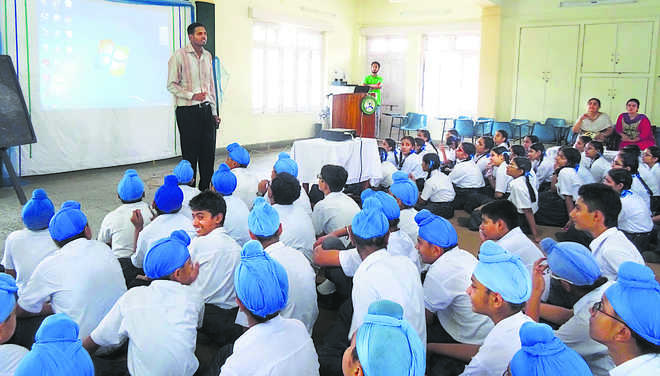
Needed: Real, and not smart, learning in school education. Tribune Photo
Amanpreet Singh Gill
Teacher at SGTB
Khalsa College, Delhi University
An old text of Sikh literature narrates an interesting story. Once a cat fell in the well and died. People were worried that the water has become polluted and they asked a Pandit for a solution. The Pandit suggested drawing out 1,000 buckets of water from the well but when people followed the advice, they found the water still putrid. The Pandit, on being asked why his advice had not worked, smiled and asked, ``did you remove the cat from the well?’’
How many times does a government take a policy decision to find out the solution for one or the other problem, and how many times it forgets to remove a dead cat out of the common well? It has become a persistent feature of decision-making by government; simple solutions are avoided because they may appear boring and dull, or they may not be a headline-maker or a vote-churner. The media also plays a role in putting the spotlight on something that actually ranks very low on the list of 'things to do' but due to hype and hysteria, it moves to the top of the list.
Dope test decision ineffective
The debate on the dope test and the exercise of politicians and government employees undergoing dope-testing is an apt case study of such a tendency. Not a single death by drug overdose can be prevented by this exercise. The government's prescription for preventing such deaths also fails the common sense test. It tried to ban the sale of syringes without a doctor's prescription. It is like banning glass to prevent drinking. The ban on syringe always encourages the reuse of syringes among addicts, leading to greater risk of HIV infections and many other such things. According to the report, “Syringe Exchange Programme around the World”, by the GMHC (Gay Men's Health Crisis), 77 countries and territories have adopted the syringe exchange programme for addicts to prevent infection.
Australia and New Zealand have syringe-vending machines to ensure 24-hour supply. In contrast, the Punjab decision, which it later revoked, looked like something from the colonial rulebook, besides lacking any base.
Decision-making limitations
According to Herbert Simon, the decision-making process always suffers from bounded rationality. The limitations of reasoning are always there due to human cognitive limitations and the structures of environment. It is very difficult to foresee the consequences of some decision or some application. All the technology has been found to be producing unintended results. But at the same time, our search for the solutions to problems cannot be abandoned. Implementing the solutions is the next challenge for any system.
In the case of Punjab, decision-making suffers extremely from bounded rationality. Lack of data prevents the emergence of a clear picture. In the absence of a working data, decisions are bound to be irrelevant. The absence of documentation makes data collection impossible and collected data untrustworthy. How many owners of land and farmers exchange receipts when they give and take land on rent? In the absence of such receipts, we don't know how many hectares of land in Punjab are cultivated on rent and how many such farmers are there. This is one small example, but it affects every third farmer or landlord in the state.
The school education sector
The Punjab Government has failed the most in finding solutions for the problems of school education. Little achievement in the learning outcome is reflected in the high failure rate, in some districts as high as 70 per cent. This has put pressure upon the government to think and act seriously to improve school education. What kind of solutions is it working on? It is going to introduce smart learning in 2,800 schools with a cost of Rs 60 crore. Smart learning creates dull students, many studies in the West have found.
What our children need is real learning, not smart learning. Real learning comes from good textbooks and good classroom practices. What is the government doing to produce good textbooks for its schools? Not much, beyond the routine practice of the Punjab School Education Board. Its officials have burnt their fingers while introducing the history textbook for Class XII. The move for smart learning comes from the obsession of the Ministry of Human Resource with e-learning, where a lot of re-inventing of the wheel has been taking place.
It is not that Punjab has always suffered from such policy atrophy. Since 1849, it has been ruled by bureaucrats, British and Indian. British ICS produced the finest studies on the state. Punjabi-origin ICS/IAS officers such as Hardit Singh Malik, Mangat Rai, MS Randhawa, Gian Singh Kahlon, Tarlok Singh and PN Thapar have contributed enormously in building the present day institutions of Punjab.
How many of the present day top bureaucrats can be compared to such personalities? Those who can offer real working solutions to the problems in Punjab? This remains to be seen.



























